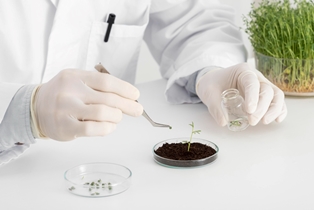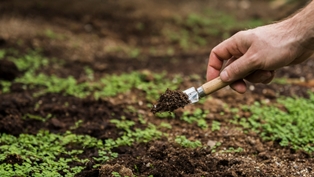Grass can transform a dull, lifeless yard into a lush, green oasis. Whether you’re establishing a new lawn or rejuvenating bare patches, understanding the germination process of grass seed is crucial for success. So, how long does it take grass seed to grow?
Understanding the Germination Process
Grass seed germination is a fascinating process that involves several key stages:

Imbibition
Before germination can begin, the seed must absorb water through a process called imbibition. This causes the seed to swell and initiate the metabolic processes necessary for growth.
Germination
Once imbibed, the seed begins to sprout a tiny root known as a radicle. This root anchors the emerging plant and allows it to absorb water and nutrients from the soil.
Shoot Development
Following germination, the shoot emerges from the seed and starts to develop into the grass plant we all recognize.
Factors Affecting Germination Time
The time it takes for grass seed to grow can vary depending on several factors:

Grass Type:
Different grass species have varying germination periods. For instance, ryegrass typically germinates within 5-10 days, while Kentucky bluegrass may take 14-30 days.
Soil Temperature:
Warmer soil temperatures generally promote faster germination. Most cool-season grasses germinate best when soil temperatures are between 60-75°F (15-24°C).
Soil Moisture:
Consistent moisture is essential for germination. If the soil dries out, the germination process may be delayed or halted.
Soil Preparation:
Proper soil preparation can significantly impact germination time. A well-prepared seedbed with good seed-to-soil contact can expedite the germination process.
Average Germination Times for Common Grass Types
Here are the average germination times for some common grass types:
- Kentucky Bluegrass: 14-30 days
- Perennial Ryegrass: 5-10 days
- Fescue: 7-14 days
- Bermuda Grass: 10-30 days
- Zoysia Grass: 14-21 days
It’s important to note that these times are averages, and actual germination may vary based on the specific conditions of your lawn.
Tips for Promoting Successful Germination
To ensure successful grass seed germination, consider the following tips:
Soil Preparation:
Clear the area of debris, loosen the soil, and ensure good seed-to-soil contact.
Watering:
Keep the soil consistently moist, but avoid overwatering, which can lead to seed rot.
Fertilization:
Use a starter fertilizer specifically designed for new grass seedlings to provide essential nutrients for early growth.
Patience:
Understand that germination times can vary, so be patient and continue to provide proper care for the newly seeded area.
FAQs Section
The germination time for grass seed can range from 5 to 30 days, depending on factors such as species and environmental conditions.
Optimal conditions for grass seed growth include well-draining soil, adequate moisture, moderate temperatures, and proper care and maintenance.
While you can’t drastically accelerate the germination process, you can promote faster growth by providing optimal growing conditions, including proper watering, soil preparation, and care practices.
Several factors, such as poor soil quality, inadequate watering, or unfavorable weather conditions, could inhibit grass seed growth. Assessing and addressing these issues can help encourage successful germination and establishment.
The best time to plant grass seed varies depending on your location and the specific grass species you’re planting. In general, spring and fall are optimal times for seeding, as they provide favorable conditions for germination and establishment.
Conclusion
The time it takes for grass seed to grow can vary based on the grass type, soil temperature, moisture, and soil preparation. By understanding the germination process and following best practices for seedbed preparation and maintenance, you can promote successful grass seed germination and enjoy a vibrant, healthy lawn.
Remember, while waiting for your grass to grow, it’s the perfect time to envision the outdoor oasis you want to create and plan for its future care and maintenance. With proper attention and care, your grass seed will soon flourish, creating a beautiful and inviting outdoor space for you to enjoy.

